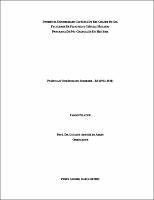| Share record |


|
Please use this identifier to cite or link to this item:
https://tede2.pucrs.br/tede2/handle/tede/5920Full metadata record
| DC Field | Value | Language |
|---|---|---|
| dc.creator | Filatow, Fabian | - |
| dc.contributor.advisor1 | Abreu, Luciano Aronne de | - |
| dc.date.accessioned | 2015-04-17T18:41:11Z | - |
| dc.date.issued | 2015-03-24 | - |
| dc.identifier.uri | http://tede2.pucrs.br/tede2/handle/tede/5920 | - |
| dc.description.resumo | O trabalho foi dedicado ao estudo das relações existentes entre política e violência no Rio Grande do Sul durante os anos Vargas, tendo como referência as disputas políticas locais e regionais ocorridas no município de Soledade, entre os anos de 1932 e 1938. Nesse sentido estudamos as consequências do Combate do Fão, fato que esteve inserido na Revolução Constitucionalista, nos governos municipais do período e nas práticas de violência que ocorreram principalmente nos períodos das eleições e a ocorrência do movimento sócioreligioso dos Monges Barbudos. Esse movimento foi reprimido pelo Estado no período de consolidação do Estado Novo sob a acusação comunismo. Mesmo estando circunscrito a Soledade, as reflexões contribuem para pensar a relação entre violência e política na história gaúcha na fase do primeiro governo Vargas. Em termos metodológicos, adotou-se a análise de conteúdo para abordar as diferentes fontes utilizadas na pesquisa. Dentre os resultados desse estudo destacamos que a violência política ocorrida na região de Soledade, no período delimitado, esteve associada às disputas pelo poder nas esferas local e regional, com importantes relações com o jogo político nacional. Primeiramente, a prática da violência tinha por propósito conter a oposição liderada pela Frente Única Gaúcha (FUG) contra o interventor Flores da Cunha e Getúlio Vargas. Num segundo momento, principalmente após 1935, a violência política passou a combater o florismo presente na região como possível ameaça, tanto à ordem quanto à segurança nacional. Situação radicalizada após a instauração do regime autoritário em 1937. Nesta situação foram inseridos os Monges Barbudos, fato que legitimou a repressão que lhe foi imposta. | por |
| dc.description.abstract | This paper is dedicated to study connections between politics and violence during the Vargas years in the state of Rio Grande do Sul. It has as reference the local disputes which occurred in the city of Soledade between 1932 and 1938. To that end, it is studied the consequences of the Combate do Fão, event that was inserted in the Constitutionalist Revolution; the local governments and the violence practices in the election periods, mainly; and the socialreligious movement of the Monges Barbudos which was repressed by the state as communists in the period of the consolidation of the Estado Novo. The reflection contributes to think the connection between violence and politics in the gaucha political history in the first phase of Vargas government, even though it was limited to Soledade. The analysis of contents is adopted as methodology during the research. Among the results obtained is pointed the political violence out in the Soledade region associated with the competition for regional and local power and important connections with the national political game. Firstly, the practice of violence aimed to suppress the opposition led by FUG against Flores da Cunha and Getúlio Vargas. In the second moment, the political violence began to fight against the florismo, mainly in 1935, which was present in that region as possible threat to both order and national security. It happened after authoritarian regime in 1937, when Monges Barbudos were inserted what legitimated an imposed repression. | eng |
| dc.description.provenance | Submitted by Setor de Tratamento da Informação - BC/PUCRS ([email protected]) on 2015-04-17T18:41:11Z No. of bitstreams: 1 467479 - Texto Completo.pdf: 10176039 bytes, checksum: 3a9dac646ff42296b4a88b29c92313aa (MD5) | eng |
| dc.description.provenance | Made available in DSpace on 2015-04-17T18:41:11Z (GMT). No. of bitstreams: 1 467479 - Texto Completo.pdf: 10176039 bytes, checksum: 3a9dac646ff42296b4a88b29c92313aa (MD5) Previous issue date: 2015-03-24 | eng |
| dc.description.sponsorship | Coordenação de Aperfeiçoamento de Pessoal de Nível Superior - CAPES | por |
| dc.format | application/pdf | * |
| dc.thumbnail.url | http://tede2.pucrs.br:80/tede2/retrieve/17664/467479%20-%20Texto%20Completo.pdf.jpg | * |
| dc.language | por | por |
| dc.publisher | Pontifícia Universidade Católica do Rio Grande do Sul | por |
| dc.publisher.department | Faculdade de Filosofia e Ciências Humanas | por |
| dc.publisher.country | Brasil | por |
| dc.publisher.initials | PUCRS | por |
| dc.publisher.program | Programa de Pós-Graduação em História | por |
| dc.rights | Acesso Aberto | por |
| dc.subject | RIO GRANDE DO SUL - HISTÓRIA | por |
| dc.subject | SOLEDADE (RS) - HISTÓRIA | por |
| dc.subject | HISTÓRIA POLÍTICA - SOLEDADE (RS) - HISTÓRIA | por |
| dc.subject | CONFLITOS SOCIAIS | por |
| dc.subject.cnpq | CIENCIAS HUMANAS::HISTORIA | por |
| dc.title | Política e violência em Soledade – RS (1932-1938) | por |
| dc.type | Tese | por |
| Appears in Collections: | Programa de Pós-Graduação em História | |
Files in This Item:
| File | Description | Size | Format | |
|---|---|---|---|---|
| 467479 - Texto Completo.pdf | Texto Completo | 9.94 MB | Adobe PDF |  Download/Open Preview |
Items in DSpace are protected by copyright, with all rights reserved, unless otherwise indicated.




